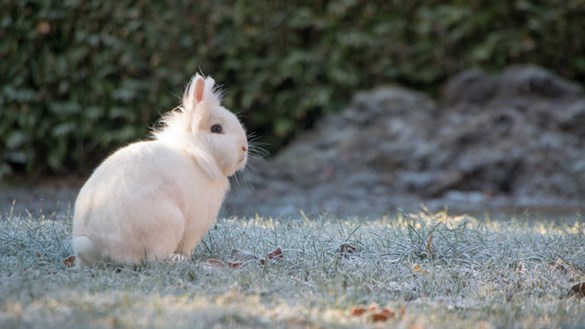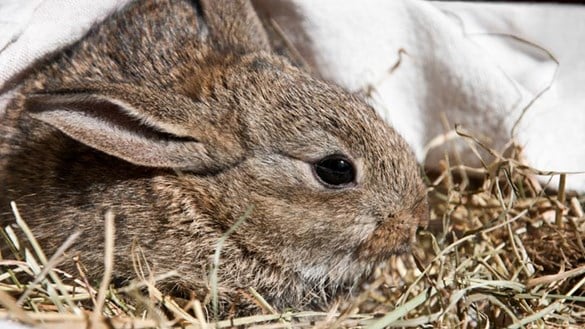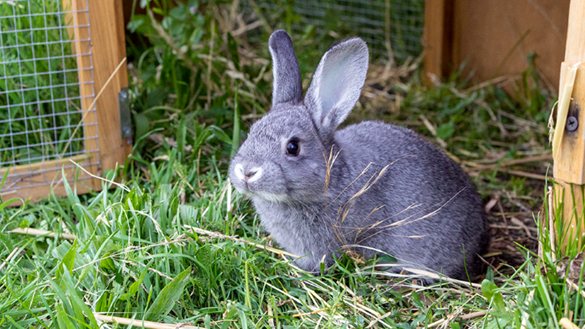Caring For Your Rabbit In Winter
Winter care for rabbits is important, especially for rabbits that live outdoors. It’s vital that you provide extra care and warmth to keep them happy and healthy through winter.
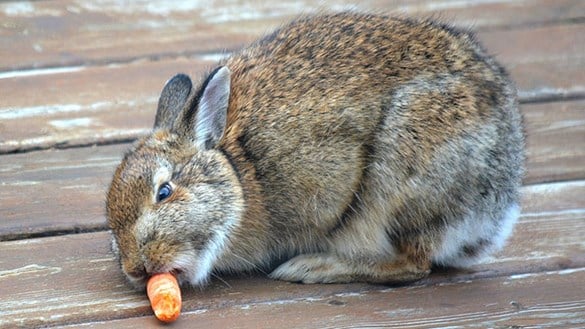
How do rabbits manage in cold weather?
Rabbits can handle the cold very well as they usually have thick fur and pads on their feet, but strong winds and damp environments can make them very uncomfortable.
Can rabbits catch a cold?
Rabbits can catch a bacterial infection that causes similar symptoms to colds in people: runny nose and eyes, coughing and sneezing. You might notice that your rabbit has dirty front paws, where they have been wiping their nose and eyes.
This type of infection is serious and highly contagious; it causes breathing difficulties and reduced appetite, so if you spot any cold or flu-like symptoms, or if your rabbit is sneezing, contact your vet immediately
Should I bring my rabbit indoors when it's cold?
If you have an outdoor rabbit, keeping them warm during cold weather can be a challenge. Ideally, you should bring their hutch inside a shed or outhouse to shelter them from the elements. Never put them in a garage where you park your car, as the fumes are toxic to rabbits’ delicate lungs.
Keeping your outdoor rabbit warm in winter
If you can’t bring your rabbit inside, move their hutch to a sheltered spot – by some trees, for example – and face them away from the wind. Cover it with an old blanket followed by tarpaulin for extra insulation and to keep the rain off, and make sure the wood isn’t damp or rotting (using rabbit-friendly wood coat every few years can help keep their hutch in great condition). Securely raise the hutch off the floor with bricks or wooden pallets to prevent damp and frost, as well as predators.
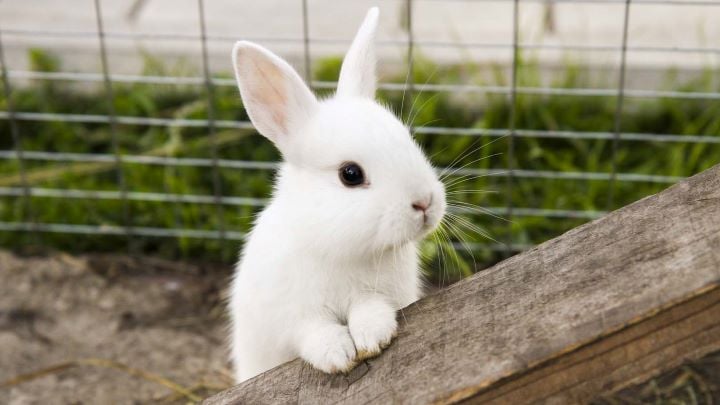
Line the hutch floor with a few layers of newspaper and add lots of extra hay and straw for your rabbit to bury into. Remember, in the wild they would be tucked away in warm, underground burrows, so replicating this environment by filling a cardboard box with straw keeps them warm and lets them exhibit their natural behaviours.
We always recommend keeping rabbits in pairs or more. Not only does this provide essential social interaction but snuggling up with their friends is the best way for a rabbit to keep warm.
Don’t forget to check on your rabbit several times a day and look out for any signs they may be suffering.
Keeping rabbits clean and dry
Cleaning your rabbit’s hutch regularly is a no-brainer for rabbit owners, and winter is no exception. Urine can freeze in cold temperatures and wet bedding can make your rabbit seriously ill, so clean and refresh their toilet and bedroom areas every day.
Check for leaks in their hutch and repair them as soon as possible to keep your rabbit’s environment dry. You should continue with your rabbit’s regular grooming routine, even in cold weather. Read our advice on grooming your rabbit for cold weather.
Hypothermia in rabbits
Hypothermia occurs when your rabbit’s body heat drops to extremely low levels, usually after being exposed to freezing temperatures or as a result of having wet fur in cold, windy weather.
Symptoms of hypothermia in rabbits
Symptoms include shivering (although this will suddenly stop when their temperature reaches dangerously low levels), pale lips and gums, low energy and a loss of coordination. Hypothermia is an emergency, so if you spot any of these symptoms, bring them into the warm and contact your vet immediately.
Frostbite in rabbits
Frostbite can occur in very low temperatures which can freeze their extremities (the tips of their ears, nose and toes). Although not usually life-threatening, it can lead to hypothermia which can be fatal.
Symptoms of frostbite in rabbits
Skin can become very pale with a blue-white hue, due to the lack of blood flow, and ice can even form around the area. To prevent it from progressing and putting the local tissue at risk, apply a warm towel to the affected area. Never use a hairdryer or radiator to directly warm them up; this can cause burns and blistering. Instead, use tepid water to warm the area gradually, dry them thoroughly and speak to your vet to check no additional treatment is required.
Arthritis in rabbits
Arthritis and joint pain worsen as the weather cools down, so if your rabbit has the condition, bear in mind that they may be in more discomfort during the winter months.
There are ways you can help soothe their pain and stiffness, which usually occurs in older rabbits in their shoulders, hips, ankles, knees and spine. Keep them warm with extra blankets around their hutch and ensure they have a plenty of dry hay to snuggle into to support their joints. Keep your rabbit moving with regular exercise in their run and help them maintain a healthy weight to reduce pressure on their joints.
Exercising your rabbit in winter
When it's cold outside, it’s tempting to skip a regular exercise routine and many rabbits would prefer to stay snuggled up in the warm. However, less exercise can lead to weight gain which can affect their overall health.
Rabbits still need regular opportunities to exercise in their run throughout the winter months. Letting them run around indoors or giving them short, frequent sessions in their outdoor hutch keeps them active and warms them up in the process. If they get wet, make sure you dry them thoroughly indoors before putting them back into their hutch.
Although it may be tempting to alter their diet if you think they’re putting on too much weight, it’s important to remember that rabbits need a few extra calories to keep themselves warm in cold weather. Always speak to your vet for expert advice about how much is too much over the winter months.
For more cold weather care tips, speak to your local Medivet practice.

Medivet Healthcare Plan
On average our clients save an average of £225 with the Medivet Healthcare Plan.
Learn more
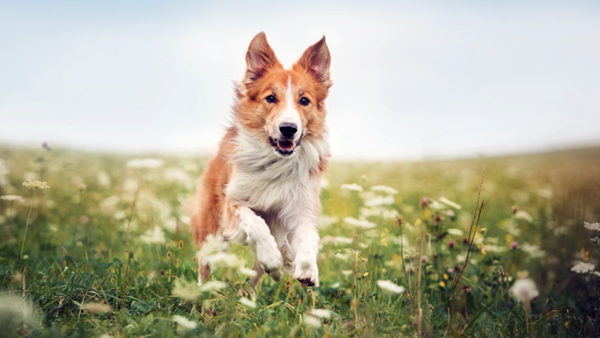
Our Pet Care Advice
At Medivet, we’re committed to providing trustworthy, expert advice that helps you care for your pet. Don't miss our latest advice for keeping your pets happy and healthy.
Search advice


